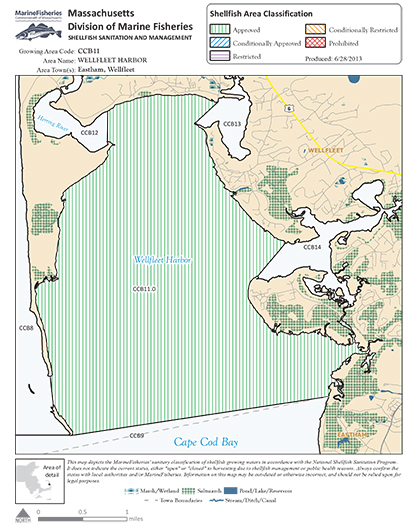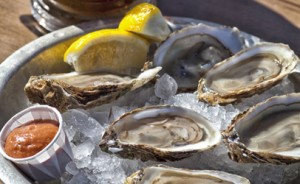After receiving reports last week of about 75 norovirus cases, the Massachusetts Department of Public Health and the Massachusetts Division of Marine Fisheries closed down shellfish beds in the Town of Wellfleet on Cape Cod.
State food protection officials also notified businesses to recall any affected shellfish harvested in the area on or after Sept. 26, according to a public health advisory issued Oct. 13.

“Public health officials have received reports of approximately 75 suspect cases of norovirus over the past two days, primarily associated with eating raw shellfish at weddings and restaurants in the Outer Cape Cod area,” the advisory noted.
Harvesting of oysters and other shellfish in Wellfleet will be closed for at least three weeks, although other Cape Cod shellfish-harvesting areas are not affected. The currently closed areas include Wellfleet Harbor, Wellfleet Inner Harbor, Herring River and Loagy Bay.
“The National Shellfish Sanitation Program requires a minimum closure of 21 days,” said Katie Gronendyke, a spokeswoman for the Massachusetts Division of Marine Fisheries in Boston. “The state has to demonstrate that there are no ongoing pollution problems by conducting a resurvey of the area and an evaluation of all real and potential pollution sources.”
It’s not clear how many businesses might be involved in the recall because locally harvested shellfish — oysters as well as mussels and clams — are shipped all over the world, said Hillary Greenberg-Lemos, a health and conservation agent for the Town of Wellfleet.
The lack of raw oysters affected the 16th annual Wellfleet OysterFest held this past weekend. No raw shellfish were served at the event, and the popular “Shuck Off” contest used oysters sourced from outside the area.
“Public safety has always been our top priority, whether it be in crowd management or health issues,” said Alex Hay, a board member of the group that puts on the OysterFest, adding, “Not only is public safety our main concern, it is also in the seafood industry’s best interest, the town’s best interest and the Wellfleet brand’s best interest.”
Norovirus is easily spread through food, person-to-person contact, or through contact with contaminated surfaces such as countertops or door knobs. The viruses can cause vomiting, diarrhea, and abdominal cramps. Other symptoms may include headache, fever, chills and muscle aches.
For most people, noroviruses cause a very unpleasant but brief illness that usually lasts one or two days. The elderly, very young and people with weakened immune systems are at higher risk of more serious illness from noroviruses. The greatest danger is from dehydration.
 The Massachusetts Department of Public Health offered this safety advice to the public:
The Massachusetts Department of Public Health offered this safety advice to the public:
- Do not eat any shellfish from the affected areas if harvested or purchased on or after Sept. 26. This includes oysters, hard-shell clams (“quahogs”), soft-shell clams (“steamers”), mussels and razor clams.
- If you are unsure where shellfish was harvested, contact the retailer or restaurant where the product was purchased.
- If you are experiencing symptoms of norovirus, or are caring for someone who is, practice good hand washing with warm, soapy water to prevent further spread of the illness.
- After episodes of vomiting or diarrhea, clean contaminated surfaces immediately with a bleach-based household cleaner and wash hands thoroughly afterward. The virus is present in large numbers in both stool and vomit.
- Contact your healthcare provider if you have more severe illness or if you think you may be dehydrated.
For more information about noroviruses, Bay State residents can contact the Massachusetts Department of Public Health’s Division of Epidemiology at 617-983-6800. For more information on the shellfish-harvesting closure notice, call 508-990-2860.
According to a study published in August 2015 in the journal Applied and Environmental Microbiology, oysters act as incubators for noroviruses to mutate between outbreaks, and raw oysters appear to be particularly dangerous in this way.
“Shellfish such as oysters, clams, and mussels are filter feeders and ingest norovirus if it is present in the water. Through filter feeding, oysters may concentrate the virus to much higher levels than might be found in the surrounding water,” the Washington State Department of Health has reported.
“Potential sources of contamination include faulty wastewater treatment plants, failing septic systems, stormwater runoff, dumping of boat sewage waste, and vomiting overboard near shellfish beds.”
(To sign up for a free subscription to Food Safety News, click here.)
